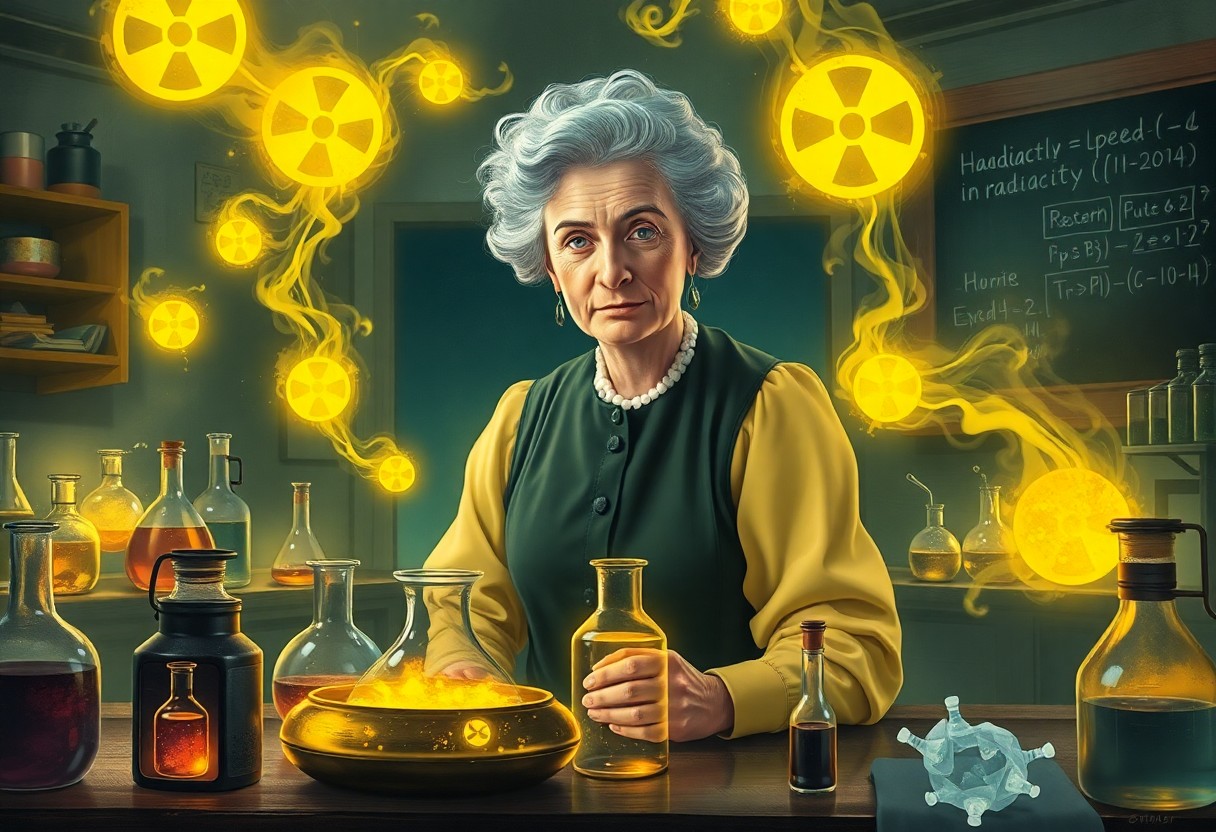With a relentless pursuit of knowledge, you will discover how Marie Curie’s groundbreaking research into radioactivity not only transformed the field of science but also led to unprecedented discoveries in medicine and physics. By exploring her innovative experiments and the dangers she faced, including exposure to harmful radiation, you will gain insight into how Curie’s fearless approach paved the way for future generations. Join us as we examine into her remarkable legacy and its lasting impact on the scientific community.
The Life of Marie Curie
Your journey into the life of Marie Curie reveals a remarkable woman who shattered barriers in a male-dominated scientific landscape. Born Maria Skłodowska in Warsaw, Poland, she became the first woman to win a Nobel Prize and remains an enduring figure in the history of science. Driven by relentless curiosity and an indomitable spirit, she made groundbreaking discoveries that would revolutionize the field of radioactivity and earn her a place among the greats in scientific history.
Early Years and Education
At a young age, Curie exhibited a deep interest in education and sciences, a passion that encouraged her to overcome the limitations imposed by her society. Despite financial hardships, she persevered through a rigorous academic journey in Poland and later in Paris, where she excelled academically, drawing closer to her dreams of scientific exploration.
Scientific Influences and Mentorship
Along her path, Curie was significantly influenced by prominent scientists who recognized her potential. She developed a strong mentor-mentee relationship with Henri Becquerel, whose work on radioactivity captivated her, leading her to explore a field that was still in its infancy.
Even as a pioneering woman in science, Curie faced numerous challenges, yet her mentorship with Becquerel provided her with valuable insights and encouragement. His groundbreaking research into radioactivity fueled her own research ambitions, enabling her to isolate new elements like polonium and radium. Through mentorship and collaboration, Curie navigated the male-dominated scientific community, leaving an indelible mark that inspires generations of scientists today.
Discovery of Radioactivity
There’s a transformative moment in the history of science when the phenomenon of radioactivity was unveiled. Pioneered by Marie Curie, this significant discovery not only altered our understanding of atomic physics but also opened doors to unprecedented applications in medicine, energy, and research. As you research deeper into radioactivity, you will uncover the groundbreaking implications it has for your world’s scientific and technological advancements.
The Initial Experiments
Before Marie Curie’s pioneering work, the concept of radioactivity was largely unknown. Through rigorous experimentation with uranium, Curie meticulously analyzed the substance’s properties, igniting your curiosity about the invisible forces at play. Her groundbreaking approach and innovative techniques laid the foundation for the discovery of previously unseen radiation, advancing your understanding of atomic behavior.
The Unveiling of New Elements
For Curie, the exploration of radioactivity led to the discovery of two new elements: polonium and radium. These elements showcased the power of radioactive decay and their potential applications. You will learn how her meticulous research illuminated the hidden aspects of matter, prompting discussions about the nature of elements and their effects on health. Curie’s work not only advanced the scientific community’s understanding but also raised awareness of the protective measures necessary while working with radioactive materials.
Considering the historical importance of Curie’s discoveries, the unveiling of polonium and radium marked a significant leap in your comprehension of atomic science. These elements demonstrated unique radioactive properties that paved the way for innovations in medical treatments, such as cancer therapies. As you explore further, it’s vital to appreciate both the benefits and risks associated with these materials, considering safety protocols and the ethical implications of their use. Curie’s dedication and her groundbreaking findings not only transformed science but also shaped the future of healthcare and research, urging you to reflect on how they impact your life today.
The Impact of Curie’s Work
The impact of Marie Curie’s work has been profound and lasting, shaping the course of modern science. Her pioneering research on radioactivity led to the discovery of new elements and laid the foundation for various scientific fields, including physics and chemistry. The knowledge she imparted continues to influence research methodologies and inspire future generations of scientists, ensuring that her legacy remains vital to current and future discoveries.
Advancements in Medical Science
With Curie’s discoveries, there was a significant leap in medical science, particularly in cancer treatment. Her identification of radium’s properties enabled its use in radiotherapy, offering new hope for patients suffering from malignant tumors. This breakthrough laid the groundwork for subsequent advancements in targeted cancer therapies, ultimately transforming patient care and outcomes in oncology.
Influence on the Scientific Community
After Curie’s groundbreaking findings, the scientific community experienced a dynamic shift, embracing the importance of interdisciplinary collaboration. Her work challenged traditional perceptions and expanded your understanding of radioactivity, motivating both women and men to pursue careers in science. Furthermore, Curie’s determined spirit and advocacy for women in research fostered a more inclusive environment, prompting institutions to reevaluate their approaches.
And this shift was not only about inclusion; it marked the beginning of a new era in scientific exploration. The rigorous scientific methods Curie championed encouraged critical thinking and accountability, while her remarkable accomplishments inspired you to push boundaries in research. As a trailblazer, she dismantled stereotypes and became a role model, showing that perseverance leads to significant advancements. Her legacy invites you to continue exploring uncharted territories in science and pursue innovative solutions for humanity.
Challenges and Triumphs
Not only did Curie face skepticism in a male-dominated scientific community, but she also encountered numerous personal and professional hurdles. Despite these obstacles, her unwavering determination led her to groundbreaking discoveries in radioactivity, which would later shape the foundation of modern science. With persistent hard work and resilience, she became a symbol of triumph against adversity in the pursuit of knowledge.
Personal Struggles
Along her journey, Curie grappled with significant personal challenges, including financial constraints, the loss of her beloved husband Pierre, and the societal pressures of being a pioneering woman in science. These struggles only fueled her resolve, leading her to persevere in the face of adversity, ultimately shaping her character and dedication to her work.
Scientific Achievements
At the forefront of her scientific contributions, Curie is celebrated for her discovery of the elements radium and polonium. Her relentless research and experimentation not only earned her two Nobel Prizes but also established her as a key figure in the field of radioactivity, paving the way for future advancements in physics and medicine.
Another noteworthy achievement was Curie’s development of techniques to isolate radioactive isotopes, contributing immensely to the understanding of atomic structure. Her pioneering work in medical applications of radioactivity led to advancements in cancer treatment, revolutionizing how illnesses are approached. You can appreciate her legacy, knowing that she opened the door to a wealth of knowledge and innovation within the scientific community, highlighting the duality of her struggles and triumphs in a demanding field.
Legacy of Marie Curie
Once again, you are reminded of how Marie Curie’s groundbreaking work established her as a beacon in the scientific community. Her discoveries in radioactivity not only advanced the field of physics and chemistry but also laid the groundwork for modern medical applications, profoundly impacting your understanding of science and health.
Honors and Recognition
Any recognition of Marie Curie’s achievements underscores the profound impact of her work. She was the first woman to win a Nobel Prize and is the only person to have won in two different scientific fields—physics and chemistry—solidifying your appreciation for her unparalleled contributions to science.
Continued Influence in Science
Along the path of scientific discovery, Curie’s legacy continues to inspire generations of researchers.
Marie Curie’s influence on science persists through her pioneering techniques in radiochemistry and radiotherapy. Your exploration of modern medicine and technology reveals that Curie’s research opened doors to numerous applications, including cancer treatment and diagnostic imaging. Her dedication to science, despite facing significant societal challenges and personal risks, exemplifies the spirit of inquiry that fuels your quest for knowledge today. You find that the principles she established are still relevant, as they guide your understanding of radioactivity and its implications in contemporary research, urging you to push boundaries in your own scientific pursuits.
Conclusion
Upon reflecting on Curie’s pioneering contributions to radioactivity, you can appreciate how her relentless pursuit of knowledge changed the landscape of science. Her groundbreaking research not only advanced your understanding of atomic physics but also paved the way for future generations to explore the complexities of radiation. By embracing the unknown, you see how Curie equipped you with the inspiration to challenge limits, highlighting the importance of courage and innovation in scientific endeavors.
FAQ
Q: What inspired Marie Curie to study radioactivity?
A: Marie Curie’s deep interest in science and her early exposure to the works of renowned scientists fueled her passion for research. The discovery of radioactivity by Henri Becquerel in 1896 captivated her, leading her to pursue this intriguing field. Her dedication to understanding the nature of radioactive elements, particularly uranium and radium, ultimately led to her groundbreaking research and significant scientific advancements.
Q: What were some of the major contributions Marie Curie made to the field of radioactivity?
A: Marie Curie’s most notable contributions include the discovery of the elements polonium and radium. She conducted pioneering experiments that revealed the properties and behaviors of these radioactive elements. Additionally, Curie’s work laid the groundwork for the field of nuclear physics and medicine, influencing how radiation is utilized in medical treatments and diagnostics today.
Q: How did societal attitudes towards women in science impact Curie’s career?
A: Marie Curie faced significant obstacles due to the prevailing societal attitudes towards women in science during her time. Despite her exceptional abilities, she encountered skepticism and discrimination, both in academia and in her research pursuits. Nevertheless, Curie’s resilience and talent allowed her to excel, ultimately breaking barriers and earning her recognition as the first woman to win a Nobel Prize, and the only person to receive Nobel Prizes in two different scientific fields.
Q: What challenges did Marie Curie face in her research on radioactivity?
A: During her research, Marie Curie faced numerous challenges, including limited funding, lack of resources, and hazardous working conditions. The effects of radiation were not well understood at the time, exposing her and her colleagues to significant health risks. Despite these difficulties, Curie’s determination and innovative approaches enabled her to overcome obstacles, leading to her landmark discoveries.
Q: How did Curie’s work influence modern medicine and technology?
A: Marie Curie’s work has had a profound impact on modern medicine and technology, especially in the areas of cancer treatment and diagnostic imaging. Her discoveries of radioactive isotopes led to the development of radiation therapy for cancer patients, significantly improving treatment outcomes. Furthermore, her research laid the foundation for advancements in medical imaging techniques such as X-rays, which are imperative tools in modern healthcare.
source link eu news


















